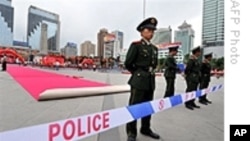Click here for Lao version/ຄລິກບ່ອນນີ້ເພື່ອອ່ານພາສາລາວ
Earlier this month, riots
broke out in Urumqi, the capital city of the Xinjiang Uighur Autonomous Region
in northwestern China, following the killing of two Uighurs at a factory in
southern China. Thousands of Uighurs, an ethnic minority group that is Turkic
and predominantly Muslim, clashed with Han civilians and Chinese police and
troops. Chinese officials report at least one-hundred ninety-two people are
dead, with more than one-thousand seven-hundred others injured. More than
one-thousand four-hundred have been arrested. In an effort to quell the
violence in Urumqi, police used tear gas, water hoses, armored vehicles, and
roadblocks.
According to U.S. Department of State Assistant Secretary for Public Affairs
P.J. Crowley, There is significant tension in that particular part of
China":
"Historical grievances, fresh concerns
about whether ethnic minorities in China receive adequate protection and have
their rich culture, their language taken into account... .It is a challenge for
China. As China grows in influence and responsibility in the world, it has to
adapt its practices more in concert with international norms, and we would
certainly encourage a dialogue going forward within China to try to resolve
these in a peaceful way.”
The United States urges clam and restraint on all sides and urges China to deal
with those arrested in connection with the unrest through fair and transparent
judicial proceedings. The U.S. remains deeply concerned over the situation and
continues to call on all parties to refrain from further violence.





